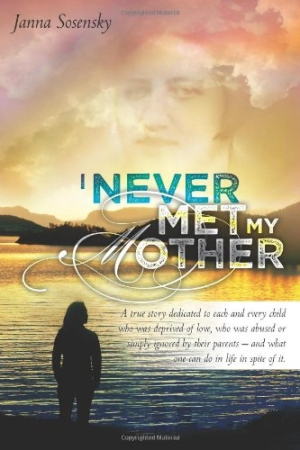I Never Met My Mother
A true story dedicated to each and every child who was deprived of love, who was abused or simply ignored by their parents---and what one can do in life in spite of it.
This powerful memoir provides rare details about the realities of life in the former Soviet Union.
Born in Moscow in 1941, a mere eight days after Germany declared war on the USSR, Janna Sosensky seems destined to face difficult times ahead. Her memoir, I Never Met My Mother, tells the heartbreaking story of her life in the USSR from a most inauspicious beginning through her emigration in 1974.
Some of Sosensky’s earliest memories are of living in an orphanage during World War II. Tellingly, she is nostalgic about the orphanage, “the place [she] secretly considered [her] real home.” Life there, even with a communal bath and clean clothes only once every two weeks, is better than what came before or is to follow.
Even school is a challenge. “Brainwashing began from kindergarten,” with mandatory membership in Communist children’s organizations starting at age seven. Initially, Sosensky wears the required red star; when she is nine, she graduates to the red tie of the Pioneers. The goal is eventual membership in the Communist Party, “for all intents and purposes a ticket for better future positions and careers.”
Teachings are rigid, and punishments severe: “Religion was repudiated…We were told that to go inside a church would be as bad as committing a serious crime.” A curious child, Sosensky sneaks into a church and is reported. Called before the entire school, she is stripped of her red tie, expelled from the Pioneers, and ostracized.
The author describes unwittingly signing a three-year work contract at fourteen, committing to a job at a massive meat plant. She writes of renting the only bed in an elderly woman’s single room in a sixth-floor walk-up, of fleas and lice, of starvation and privation. In Moscow, where virtually anything is available to those with means, Sosensky is limited to what she can purchase through the company’s own store and layaway plan, further binding her to her employer.
Sosensky’s personal story is devastating; its setting within the USSR during a time of suppression renders it even more horrific. She speaks openly about propaganda, education, working conditions, and social life. Even the smallest elements of her stories are revealing. Every mention of a “valuable tradition,” like the customary celebration of the New Year, or of “certain things that were supposed to be done by everybody—no exceptions,” offers insight into a society that has long remained a mystery to much of the world.
Topics range widely, from the control maintained by centralized offices in Moscow over industry “in every republic of the USSR” to the treatment of homosexuals: “The minimum sentence for any homosexual activity was twenty years in prison.” Stories of love and marriage are particularly unsettling. “There was no birth control whatsoever,” she says. “Abortions were the only alternative available…There was hardly a woman who hadn’t had several. Five abortions was the average.”
That Sosensky survived and ultimately escaped the constraints of her youth serves as a testament to her convictions and fortitude, and I Never Met My Mother stands on its own as a well-written memoir. Its greatest impact, however, comes from the historical detail and perspective it provides. Sosensky’s revelations about life—particularly life for a young woman—in Soviet Russia during WWII and the Cold War years are not only unusual but impressively dynamic and decidedly enlightening.
Reviewed by
Cheryl Hibbard
Disclosure: This article is not an endorsement, but a review. The publisher of this book provided free copies of the book and paid a small fee to have their book reviewed by a professional reviewer. Foreword Reviews and Clarion Reviews make no guarantee that the publisher will receive a positive review. Foreword Magazine, Inc. is disclosing this in accordance with the Federal Trade Commission’s 16 CFR, Part 255.

